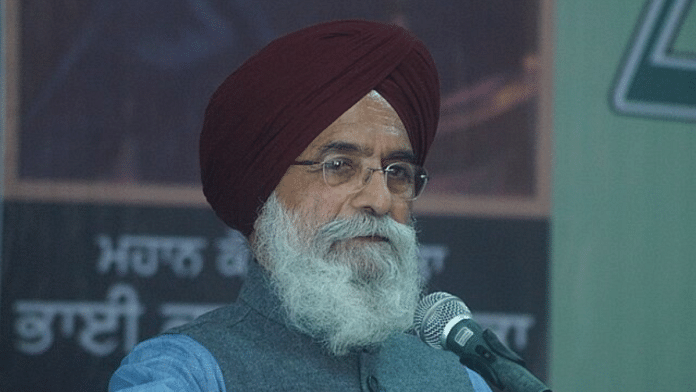Born in Patar Kalan village near Kapurthala in Punjab in 1945, a little boy called Surjit Patar was blessed with melody, which he carried with him wherever he went. As he did the name of his village.
The memories of his childhood were shaped by the mud walls of his home, a grinding stone, and a wizard of a father who could shape pieces of wood into many artefacts. The wizard, the head of the house, left home to work in Kenya to provide for his family. As Surjit grew up, he captured the scene in a poem, “Sunne sunne rahwan vich koi koi pairh hai, Dil hi udaas hai, Baaki sab khair hai…”( Just a few footprints on the lonely dust track/ The heart broods but the rest is well). The father did uplift the family, but he would return home for only short visits after being away for five years at a time.
Love and longing
With words of love and longing, a splendid journey began for the boy who would become a poet. He described himself as a tree, translating ‘even the sighs of the trees’ into Punjabi: ‘Hava di saan-saan da Punjabi vich anuvaad karda ajeebo-ghareeb darkhat haan’. This frail young boy grew up to become a major poet of Punjabi language, winning many awards and accolades including the Sahitya Akademi Award, and the Padma Shri.
Surjit Patar was also the chairperson of the Punjab Arts Council in Chandigarh for several terms till he died in his sleep in his home in Ludhiana on 11 May 2024. Interestingly, when he was to be appointed as the head of the arts council, Punjab’s former Minister of Cultural Affairs Navjot Singh Sidhu visited the poet’s home to offer him the appointment letter. Patar’s popularity as a poet was remarkable, following in the footsteps of the famous Shiv Kumar Batalvi. However, unlike Batalvi, who was known for his excesses, Patar lived a long life and was able to reap the rewards of his fame.
After getting a master’s degree in Punjabi literature from Punjabi University, Patiala, Patar completed a PhD on ‘Transformation of Folklore in Guru Nanak Vani’ at Guru Nanak Dev University, Amritsar. Following this, Ludhiana, the city of the famous poet Sahir Ludhianvi, became his home.
Also read: Safdar Hashmi took theatre to the streets—‘He fought our battles for us’
Songs of the soil
Young Patar had dreamed about becoming a singer because his father used to sing shabads from the Gurbani. However, as he grew up and the rhythms of the Punjabi soil and the warmth of words combined to feed his creative imagination, he chose ghazals as his outlet. Punjabi had a long tradition of ghazals borrowed from Urdu but it was Patar who brought contemporary thought and words to it, which often irked the conventional poets. To this, Patar’s reply was: ‘Assee taan khoon vich dubo ke kalam likhi hain ghazal, O’ hore honege likhde ne jeharhe behar andar’ (We have dipped the pen in blood to write a ghazal/ There may be others who write in the bondage of meter).
Patar presented his ghazals and songs in ‘tarranum’, singing in his haunting voice and reaching straight to the hearts of the listeners. Punjab, its history, culture, failings, tragedies, and the healing of wounds are themes that recur in his verses—and it was all personal to him. As a student in Patiala, he was influenced and inspired by the ultra-Left movement in 1960s but never became a part of it. One of his famous poems of that time is ‘Hun gharan nu paratna mushkil barha hai, Kaun pehchanega sanu, Mathe utte maut daskhat kar gayi hai, Chehare utte yaar painda chhad gaye ne, Sheeshe vichon hore koi jhankda hai’ (It is difficult to return home/Who will know us now, Who will recognise us now? Friends have left their footprints on our forehead/And someone else glances from the mirror).
The Khalistani movement compelled Patar to address Punjabiat again and recall the Partition: ‘Kal Waris Shah nu wandea si, Ajj Shiv Kumar di Waari hai, Oh zhakhm tuhanu phul vi gaye, Je navean di hore tayiari hai? (We divided Waris Shah then/Now comes the turn to divide Shiv Kumar Batalvi/Have you forgotten the wounds of yore that you are trying to inflict new ones) In recent times, his poems stressed upon inclusive culture of Punjab, the decline of the Punjabi language, mass migration to foreign lands and empathy for the Bihari labourers who now till the fields in the state.
His death has left a void in the poetry circles, not only in Punjab but across the country. Of course, our Patar was no saint, nor should we depict him as such. He was human as they come with many pitfalls but he will always be remembered and loved as one of the most eloquent poets of our times.
I witnessed an endearing moment while accompanying him to the Doordarshan Bhawan in a cab from the India Habitat Centre in New Delhi to record an interview. The cab driver asked me, “Is he Surjit Patar?” When I nodded yes, he was so thrilled that he stopped the cab by the roadside. Then he asked me to click his picture with Patar to show his sister who would not believe that he had driven the great poet in his cab.
Nirupama Dutt is an author, poet and journalist. Views are personal.
(Edited by Ratan Priya)



